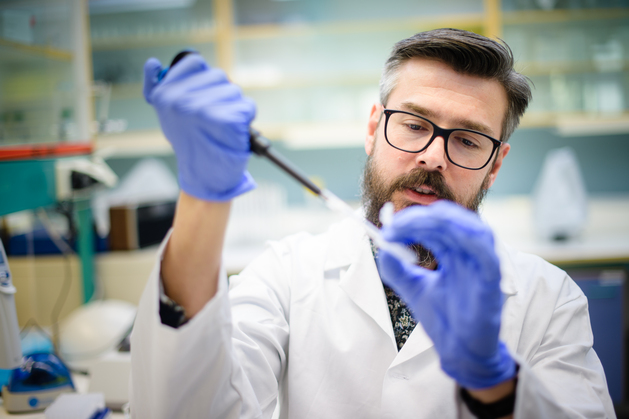COOLFISH
Improving Atlantic salmon health and welfare by metabolic programming

In COOLFISH, we will investigate the role of embryonic temperature on the development and function of the Atlantic salmon immune system later in life, and exploit this knowledge to enhance fish health, welfare and production.
Start
01. Nov 2021
End
31. May 2025
Funded by
The Research Council of Norway
Cooperation
Rolsin Institute, UK, Nord University, Norway, University of Oslo and Leibniz Institute for Farm Animal Biology, Germany.
Project Manager(s):
Other Participants:
Background
In the Norwegian salmon industry about 20% of fish fail to reach the end of the production line, largely due to infectious diseases indicating impaired immune function.
There is thus a clear need to produce salmon with high robustness, i.e. rapid growth coupled to a high level of disease resistance.
However, immune function and growth systems in fishes are highly interlinked due to trade-offs in energetic allocation; a challenge producing robust salmon. Environmental stress during critical developmental periods can permanently change the physiology and immunology of an organism (metabolic programming).
We propose that high embryonic temperatures predisposes salmon to reduced immune function and disease later in life.
Goal
This project’s primary objective is to define the role and mechanistic basis for programming by embryonic temperature on the development and function of the Atlantic salmon immune system later in life, and exploit this knowledge to enhance fish health, welfare and production.
Secondary objectives:
- Investigate the impact of embryonic temperature on disease resistance and performance parameters relevant to salmon farming.
- Reveal the effects of embryonic temperature on subsequent metabolic and cellular phenotypes presumed to regulate investment into immune function and disease resistance.
- Elucidate the underlying epigenetic, transcriptomic, proteomic and metabolomic mechanisms of metabolic programming by embryonic temperature on immune function.
What we do
In COOLFISH, a long-term experiment of ca. 70 weeks will be run at the Tromsø Aquaculture Research Station.
From fertilization until the eyed-stage, eggs will be subjected to three different temperature regimes creating three groups: 4°C, 6°C, and 8°C (control used widely in aquaculture).
After reaching the eyed-stage, all groups will be kept under similar controlled temperature conditions until ca. two months after seawater transition.Such a long-term experiment is essential to test our hypothesis that early metabolic programming results in improved immune function at seawater stages of production.
During this period, we will measure the effects of embryonic temperature on a range of performance parameters, including growth, survival, deformities and smoltification.
In order to address the effects of embryonic temperatures on the development of the immune system, multiple samples will be collected during early life stages. We will perform a whole-animal microplate challenge assay to study the immune responses of larvae to pathogen-associated molecular patterns. This strategy will allow us to investigate immune responses to pathogenic insults using a low but still, statistically robust number of animals, hence addressing the 3Rs in research.
At the parr stage (juvenile salmon), fish will be subjected to a pathogen challenge. Yersinia ruckeri has been selected as the model pathogen because
- it is highly relevant at this stage of production;
- there have been an increasing number of yersiniosis outbreaks in the last years; and
- Nofima has an established challenge model for this pathogen.
During the challenge samples will be obtained from to study in-depth molecular responses to the pathogen of fish reared under different embryonic temperatures.
During seasonal temperature changes, the immune function of fish is often challenged, leading to increased occurrence of disease and mortality. Maintaining effective immune function is highly energy demanding and being able to cope better with reducing temperatures through lower SMR may be very beneficial in terms of freeing energy to wire towards immune processes.
We specifically hypothesise that low embryonic temperature alters the coping ability to low water temperature shown by lower SMR.
Fish will be subjected to a control and changing experimental temperature to study if embryonic temperature influences the expression of key energy metabolic enzyme coding genes, which will be assessed in two metabolic tissues (liver and muscle).
The long-term effects of metabolic programming by embryonic temperature will be assessed on three immune tissues through integrative analyses of the epigenome (DNA methylation), transcriptome, proteome and metabolome in parr stage fish challenged with Y. ruckeri.
The analyses will be performed on head kidney, gills (key site for mucosal immunity) and liver (capturing broader immune-metabolic remodelling and cross-talk).
Integrated analysis will be done to correlate and define connections between the epigenomic, transcriptomic, proteomic and metabolomic profiles across the different experimental groups, revealing the primary molecular drivers of metabolic programming of immune function to embryonic temperature.
Focusing on the immune system, the COOLFISH project will characterize physiological changes in salmon phenotypes to different embryonic temperature regimes using multi-level analyses.
This ambitious and multidisciplinary project will provide in-depth knowledge on the physiological and integrated molecular mechanisms driving the interaction between the embryonic rearing environment and immune system function. New knowledge will be created that can be directly implemented by the industry towards the production of robust fish.
Research facilities